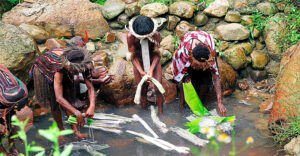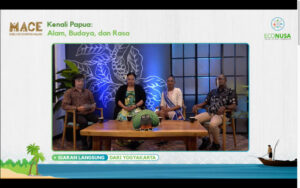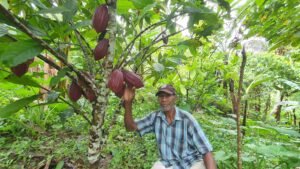
In the north of Kaimana Regency is Tanggaromi Village. The distance is about 30 kilometers from the city center. The village, which is inhabited by around 200 residents, grows vegetables and plants bananas to support their lives. This gardening is passed down from their parents and ancestors long ago.
One of them is Mama Evi (40) who since she was a child lived in Tanggaromi. Mama Evi told me that she can garden and plant bananas on the upbringing of her parents. From this effort, Mama Evi is able to send her children to school. No wonder that he strongly believes that gardening is a life for him.
“My parents used to teach me gardening since I was a child. Every day planting vegetables. Every day, bananas are planted. They taught me until I could, until I could work to earn my own money, “said Mama Evi.
“The first time I was taught to grow cassava, sweet potatoes, and bananas,” he recalled while sitting leisurely in the market waiting for his wares. “Her name is also a woman, we have to study since childhood.”
He also applied this inheritance to his six children. His first child is now 20 years old. He is the most diligent and obedient helping him garden and plant bananas. “My six children teach gardening, teach planting bananas. Like me before, they taught me to work fast. I told them to work, they work, “he said proudly.
For Mama Evi, bananas are very important. “I get money to live, to eat, to send the children to school from bananas,” he said while playing with his last child named Shentika. According to Mama Evi, the price of one comb banana on the market is Rp. 15-20 thousand. Within a week he can earn Rp 500 – 600 thousand. If the market is busy he can get Rp800 thousand. “Most in demand right on a big day like Christmas. In 3 weeks I can get Rp 4 million, “he said with sparkling eyes.
Mama Evi sometimes sells vegetables and bananas at the Tanggaromi market. Not infrequently he brought the results of his garden to the market in the city of Kaimana. “If you bring it to the city, the price will increase. Because the distance is far and people have to take a taxi back and forth. The price of a taxi alone is IDR 150 thousand. So if you go to town 1, Mama combs Rp. 50,000, “he said.
Mama Evi’s hard work did not stop there. Sometimes at night Mama still goes out to sea to fish. “Whatever I do. Nature gives a lot of things that can be utilized. The fish that Mama usually catches is no roaring fish or burapu fish. Mama sells 1 large tail of IDR 50 thousand while the current one is IDR 30 thousand, “he said.
Like the Mothers in the Land of Papua in general, they can not be separated by the traditional bag of Papua, namely Noken. “Sometimes Mama makes Noken, but here Noken doesn’t sell well. So sometimes you only make it if you have an order, ”he said, implying the persistence of life that he lived.
Hope Mama Evi is now only one. “If I become a farmer, I want to be a successful farmer. If you become a fisherman, yes a successful fisherman. If you become a trader, of course a successful trader. Hard work must be done in order to be successful. That’s what I apply to Mama’s children, “concluded Mama Evi, a portrait of Kaimana residents’ optimism.
Editor: Leo Wahyudi







